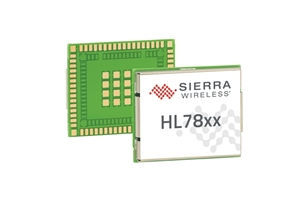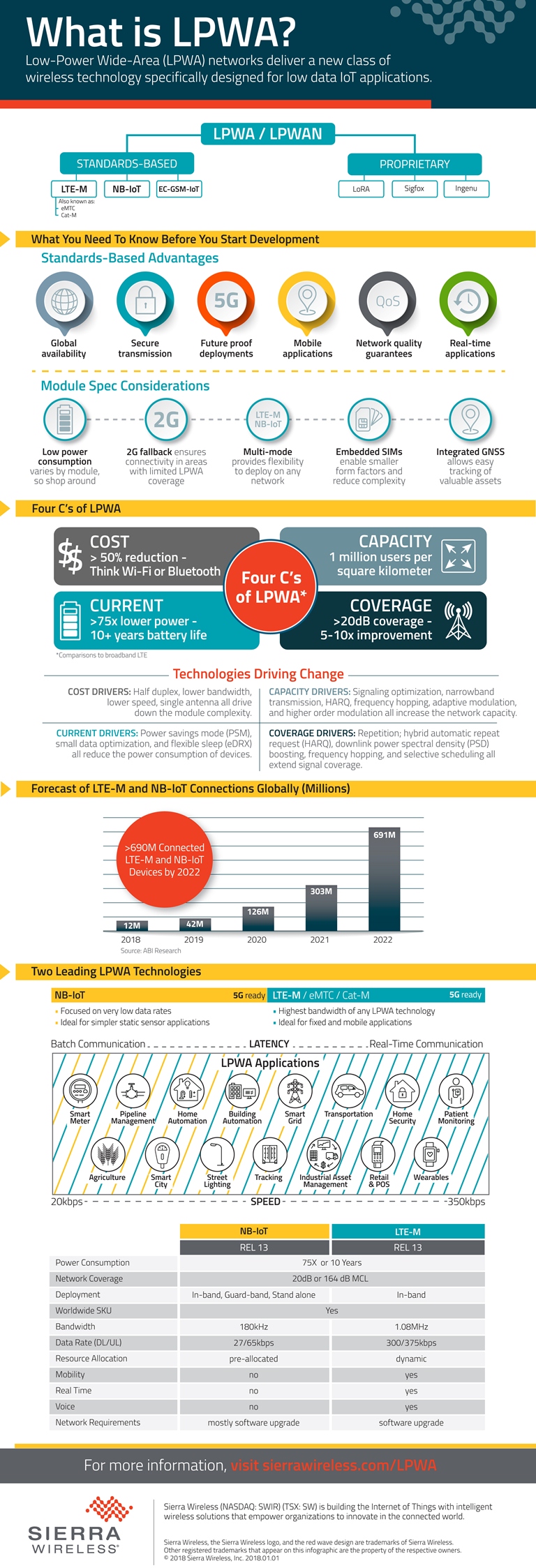Sierra Wireless integrates SIM, security and GNSS into industry’s smallest, lowest power multi-mode LPWA modules

Sierra Wireless, the provider of fully integrated device-to-cloud solutions for the Internet of Things (IoT), announced the industry’s smallest, lowest power, multi-mode Low Power Wide Area (LPWA) cellular modules targeted at rapidly growing markets in asset tracking and connected industrial equipment, smart city, healthcare, agriculture and wearables.
AirPrime® HL78 modules, featuring Altair Semiconductor’s integrated ALT1250 chipset, deliver best-in-class power performance extending the life of battery operated devices by 5-10X compared to other available LTE-M/NB-IoT modules. This new level of power saving modes, with improved wake-up and sleep mode responsiveness, as well as ultra-low sleep mode power, make HL78 the module of choice for any power-constrained IoT application.
“With the HL78 modules, OEMs and system integrators have the most scalable, lowest power module platform to build their global IoT applications on,” said Dan Schieler, senior vice president and general manager, OEM Solutions, Sierra Wireless. “And to make it even simpler for our customers, we’ve integrated the SIM and cloud, as well as GNSS and security features, to drive down the size of LPWA connected devices while enhancing tamper resistance and security.”
In addition to low-power performance unique to the HL78 design, the modules integrate GNSS tracking capability, security and an embedded SIM in a new compact CF3® size (18mm x15mm) that is pin-to-pin compatible with other HL Series modules.
Customers have the flexibility to deploy the same device on global LTE-M (Cat-M1/eMTC) and NB-IoT (Cat-NB1) networks, with support for more than 20 LTE frequency bands in addition to optional 2G fallback. Built-in security, including HTTPS, secure socket, secure boot and free unlimited firmware over-the-air (FOTA) updates from the AirVantage® device management IoT Platform, helps customers ensure HL78 deployments are future proof and secure.
“More than 690 million LTE-M and NB-IoT connected devices are expected by 2022, and the market needs a low-power, compact embedded module to connect their industrial, smart city, smart home and simpler static sensor applications,” said Dan Shey, managing director and vice president at ABI Research. “With the addition of the HL78 product line, Sierra Wireless has amassed a broad portfolio of low power devices to drive the billions of advanced IoT connections we expect in the next decade.”
LTE-M and NB-IoT LPWA networks deliver a new class of wireless technology specifically designed for low-power IoT applications [see infographic]. LPWA technologies combine lower cost, broader coverage and better battery life with globally available and secure cellular networks ready to connect hundreds of millions more things to the Internet.

“The ability to switch seamlessly between any commercially deployed LTE-M or NB-IoT frequency band gives HL78 customers the flexibility to choose which network they want to deploy their low bandwidth application on. And for those regions where LPWAN coverage is not as widely available, optional 2G fallback ensures their devices stay online,” said Ilan Reingold, vice president, Business Development and Marketing at Altair Semiconductor (A Sony Group Company). “Incorporating Altair’s advanced IoT chipset, HL78 devices will also enjoy an extended life of up to 15 years on a single battery.”
Availability
The AirPrime HL78 modules are fully compliant with the 3GPP Release 13 standard and are Release-14-ready to support NB2 features in the future. Sierra Wireless AirPrime HL and WP Series modules are the smallest embedded modules to be completely interchangeable across 2G, 3G, 4G and LPWA technologies.
They use the CF3® form factor, which is footprint compatible across product lines, providing customers with the option to develop smarter by building their connected IoT product or service on a single module. HL7800 and HL7802 modules are sampling with lead customers now, with general availability in Q3 2018.
Comment on this article below or via Twitter @IoTGN
